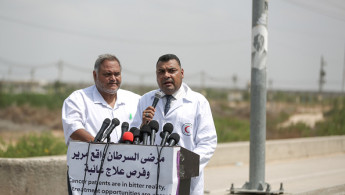At least 9,000 cancer patients in Gaza face death due to lack of medical treatment
At least 9,000 Palestinian cancer patients in the besieged Gaza Strip have been struggling against death due to a severe lack of medical treatment because of restrictions placed by Israel on the coastal enclave.
Gaza's health ministry, ruled by the Islamist movement of Hamas, said in a press conference held in Gaza, "The shortage of medicines that threatens the lives of more than 9,000 cancer patients in the Strip."
The ministry urged the international community "to urgently intervene to save their lives before it is too late".
"Cancer patients in the Gaza Strip suffer from a lack of diagnostic and treatment capabilities, with the increasing number of cases of cancer patients among the population of the Strip," Subhi Skaik, Director General of the Turkish Friendship Hospital and Gaza Cancer Center, said during the press briefing.
"There are currently more than 9,000 cancer patients in the Gaza Strip," Skaik added, further pointing out that the incidence of cancer is 93.1% among every 100,000 citizens, while this rate was 60% in 2000.
He explained that "the statistics of the World Health Organisation talk about an increase in the current rate of tumours, which amounts to 93.1% among every 100,000 citizens, to double in 2040," stressing that the high death rate among cancer patients is 12.5%.
Skaik underscored that cancer patients suffer from a severe shortage of medicine, the lack of radiotherapy, chemotherapy capabilities, and diagnostic and analysis capabilities.
In turn, Ashraf Abu Mhadi, Director General of Pharmacy at the Ministry of Health in Gaza, explained that 45% of the medicines needed for oncology patients were unavailable during the past six months, leading to patients not receiving the necessary treatment protocol.
He emphasised the importance of therapeutic medicines provided to patients, especially cancer patients and that the lack of medicine negatively affects service provision to patients.
He indicated that oncology patients follow an integrated treatment regimen of several medications that complement each other. When one is missing, the patient's required treatment is incomplete. He noted that over half of the patients did not receive the integrated treatment service.
Abu Mhadi stressed that the health system in the Gaza Strip is under tremendous great stress in light of the unavailability of medicines and the patients' continuous efforts to obtain the missing treatment without finding any suitable solution.
He called on all institutions, companies, and donors to provide the necessary and adequate treatment protocol for oncology patients, in particular, to prevent the worsening of the patient's health condition and relapse for them.
For his part, Ashraf al-Qidra, a spokesman for the Ministry of Health in Gaza, said during the conference that "more than 40% of medical referrals given to cancer patients are rejected by the occupation, which doubles the pain of patients and causes the death of a number of them."





 Follow the Middle East's top stories in English at The New Arab on Google News
Follow the Middle East's top stories in English at The New Arab on Google News


